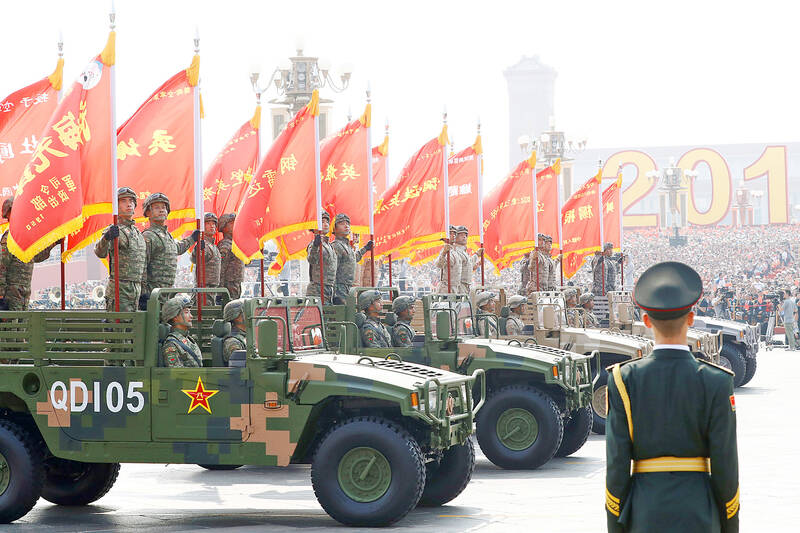Beijing’s self-assessments of its military readiness “represent genuine anxieties” among its leadership about the Chinese People’s Liberation Army’s (PLA) readiness for real combat conditions, a US Department of Defense report said.
The Pentagon’s annual report to the US Congress, released on Thursday last week and titled Military and Security Developments Involving the People’s Republic of China, said that the military shortcomings the PLA has highlighted publicly are “likely to guide and accelerate force-wide modernization efforts.”
The PLA routinely highlights shortcomings using slogans or phrases to urge the military to carry out improvement campaigns, which this year include: the “five incapables,” the “two incompatibles,” the “two big gaps,” the “two inabilities” and the “three whethers,” the report said.

Photo: Reuters
The “five incapables” slogan highlights concerns over shortcomings in training and education “that reportedly left some commanders — particularly at the operational level — inadequately prepared for modern warfare,” it said.
Some commanders cannot judge situations, understand the intentions of higher authorities, make operational decisions, deploy forces and manage unexpected situations, it said.
The “two inabilities” slogan refers to the PLA’s inability to fight a modern war and the inability of its officers at all levels to command in a modern war, it said.
The “two incompatibles” refers to the PLA’s concerns that it “does not meet the requirements of winning local war under informatized conditions” and “does not meet the requirements of carrying out its historic missions at the new stage of the new century,” the report said.
The PLA uses the slogan “two big gaps” to highlight “enduring concerns” about its true fighting capabilities despite years of modernization efforts and its belief that it is “behind the world’s most capable militaries,” it said.
The second gap is that it does not meet national security requirements, it said.
As for the “three whethers,” the report said that the PLA is concerned about whether its armed forces can maintain the Chinese Communist Party’s (CCP) “absolute leadership” and can “fight victoriously when needed,” and whether “commanders at all levels are competent to lead forces and command in war.”
Institute for National Defense and Security Research analyst Shu Hsiao-huang (舒孝煌) said that the CCP is concerned about its capability to carry out joint operations, face new challenges and sustain itself in modern warfare following its 2015 military reforms.
It is unknown whether the PLA has come to a conclusion or decided on a strategy regarding US deployments in the Indo-Pacific region in the past few years, Shu said.
Taiwan’s military said that it is ever vigilant and has continued to train its forces, citing recent collaborations between the Republic of China Air Force and the French Air and Space Force as an example.
A team of French and Taiwanese pilots have been flying simulated combat exercises starting from the middle of this month through early December at an air base in Hualien County, it said.

‘DENIAL DEFENSE’: The US would increase its military presence with uncrewed ships, and submarines, while boosting defense in the Indo-Pacific, a Pete Hegseth memo said The US is reorienting its military strategy to focus primarily on deterring a potential Chinese invasion of Taiwan, a memo signed by US Secretary of Defense Pete Hegseth showed. The memo also called on Taiwan to increase its defense spending. The document, known as the “Interim National Defense Strategic Guidance,” was distributed this month and detailed the national defense plans of US President Donald Trump’s administration, an article in the Washington Post said on Saturday. It outlines how the US can prepare for a potential war with China and defend itself from threats in the “near abroad,” including Greenland and the Panama

The Chinese Nationalist Party (KMT) is maintaining close ties with Beijing, the Democratic Progressive Party (DPP) said yesterday, hours after a new round of Chinese military drills in the Taiwan Strait began. Political parties in a democracy have a responsibility to be loyal to the nation and defend its sovereignty, DPP spokesman Justin Wu (吳崢) told a news conference in Taipei. His comments came hours after Beijing announced via Chinese state media that the Chinese People’s Liberation Army’s Eastern Theater Command was holding large-scale drills simulating a multi-pronged attack on Taiwan. Contrary to the KMT’s claims that it is staunchly anti-communist, KMT Deputy

RESPONSE: The government would investigate incidents of Taiwanese entertainers in China promoting CCP propaganda online in contravention of the law, the source said Taiwanese entertainers living in China who are found to have contravened cross-strait regulations or collaborated with the Chinese Communist Party (CCP) could be subject to fines, a source said on Sunday. Several Taiwanese entertainers have posted on the social media platform Sina Weibo saying that Taiwan “must be returned” to China, and sharing news articles from Chinese state media. In response, the Mainland Affairs Council (MAC) has asked the Ministry of Culture to investigate whether the entertainers had contravened any laws, and asked for them to be questioned upon their return to Taiwan, an official familiar with the matter said. To curb repeated

Myanmar has turned down an offer of assistance from Taiwanese search-and-rescue teams after a magnitude 7.7 earthquake struck the nation on Friday last week, saying other international aid is sufficient, the National Fire Agency said yesterday. More than 1,700 have been killed and 3,400 injured in the quake that struck near the central Myanmar city of Mandalay early on Friday afternoon, followed minutes later by a magnitude 6.7 aftershock. Worldwide, 13 international search-and-rescue teams have been deployed, with another 13 teams mobilizing, the agency said. Taiwan’s search-and-rescue teams were on standby, but have since been told to stand down, as